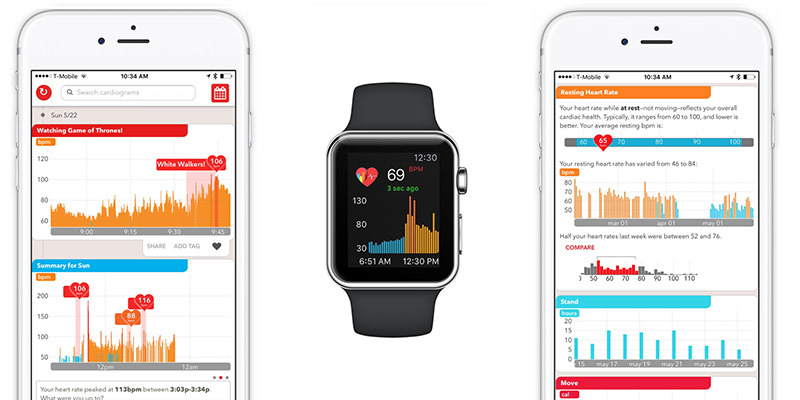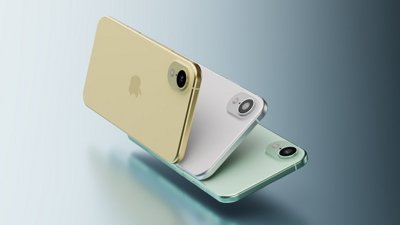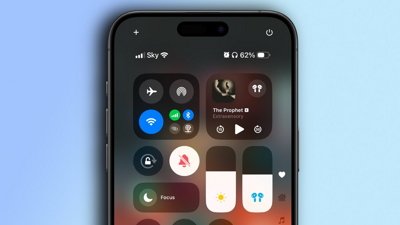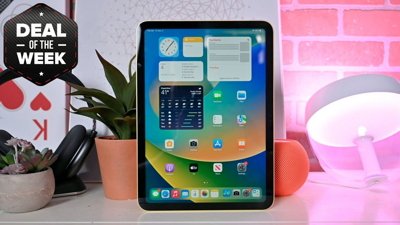Cardiogram, the HealthKit-enabled Apple Watch app powering an ongoing University of California, San Francisco heart study, received a major update on Thursday with support for native watchOS 2 operation, a new complication, 3D Touch support for iPhone 6s and a refreshed look.
With today's release Cardiogram hits version 1.0, one of many milestones developers Brandon Ballinger and Johnson Hsieh have reached as they work to refine an algorithm that may one day save lives. In collaboration with the UCSF Health eHeart study, the team at Cardiogram is investigating methods of detecting abnormal heart rhythms using off-the-shelf consumer smartwatches with heart rate sensors, like Apple Watch.
To that end, the latest Cardiogram release comes with a host of upgrades, the most apparent being a redesigned user interface. More importantly, however, the new version is a native watchOS 2 app, meaning users can track and view recorded heart rate data without tethering to an iPhone. Users also have at-a-glance access to their latest heart rate readings — Time Travel supported — thanks to a new Apple Watch complication.
The iPhone companion app has also been revamped to include detailed activity statistics showing heart rate trends, as well as a Metrics pane that integrates move, stand and exercise goals. Owners of Apple's iPhone 6s and 6s Plus have access to 3D Touch gestures for tagging heart rate peaks, a useful tool for chronicling and identifying potentially abnormal rhythms. Other enhancements include data sharing over social networks, pinch-to-zoom and general UI tweaks.
As a HealthKit app, Cardiogram shares user data with the mRhythm Study, a program that seeks to accurately detect atrial fibrillation, a medical condition that can lead to stroke, using readily accessible consumer grade hardware. An advanced machine learning algorithm developed by UCSF researchers and Cardiogram's software engineers processes the incoming data, gaining accuracy with each logged session.
The team notes anyone with an Apple Watch can take part in the study as the algorithm "learns" from users both with and without preexisting heart conditions. Since March 2016, the program has collected 700 million data points from Cardiogram users who open the app an average of five times per day.
Cardiogram version 1.0 is available now as a free 17.4MB download from the iOS App Store.
 Mikey Campbell
Mikey Campbell














 AppleInsider Staff
AppleInsider Staff
 Malcolm Owen
Malcolm Owen
 Oliver Haslam
Oliver Haslam
 Andrew O'Hara
Andrew O'Hara

 Wesley Hilliard
Wesley Hilliard
 William Gallagher
William Gallagher
 Christine McKee
Christine McKee








9 Comments
Apple should acquire them. To have small team at Apple investing all their time exclusively into this issue is a noble proposition.
I say buy them...and then let them keep doing what they're doing. Basically all you're doing is giving them proper funding. If Apple wants to push for health devices/accessories/apps this is one of the best ways to do it IMO. Its not a distraction if you just let them do what they're already doing. Its not like they need to be steering in the right direction. They've already done great work so they know what they're doing. It would be a totally different story if they were a mess of a company and the left hand didn't know what the right hand was doing. Then yes its probably not a good buy, but this isn't the case.
Only good could come out of this. If Apple doesn't buy them, then some stupid company will and totally screw up everything they've accomplished. This is what always seems to happen. I'd hate to see someone like Samsung or Google buying them out just so Apple can't.